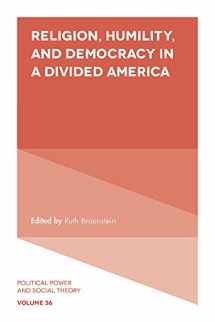
Religion, Humility, and Democracy in a Divided America (Political Power and Social Theory, 36)
ISBN-13:
9781789739503
ISBN-10:
1789739500
Author:
Ruth Braunstein
Publication date:
2019
Publisher:
Emerald Publishing
Format:
Hardcover
192 pages
FREE US shipping
Book details
ISBN-13:
9781789739503
ISBN-10:
1789739500
Author:
Ruth Braunstein
Publication date:
2019
Publisher:
Emerald Publishing
Format:
Hardcover
192 pages
Summary
Religion, Humility, and Democracy in a Divided America (Political Power and Social Theory, 36) (ISBN-13: 9781789739503 and ISBN-10: 1789739500), written by authors
Ruth Braunstein, was published by Emerald Publishing in 2019.
With an overall rating of 3.5 stars, it's a notable title among other
books. You can easily purchase or rent Religion, Humility, and Democracy in a Divided America (Political Power and Social Theory, 36) (Hardcover) from BooksRun,
along with many other new and used
books
and textbooks.
And, if you're looking to sell your copy, our current buyback offer is $0.3.
Description
This volume asks how religious convictions inform citizens' engagement in American democratic life, particularly across deep political divides. Strong religious convictions motivate citizens across the political spectrum to engage in public life, yet are also viewed as a driver of political polarization by encouraging too much arrogance and not enough humility. Featuring contributions from leading experts on religion and democratic life in the United States, this volume combines theoretical reflections on this tension with empirical investigations into how a range of religious actors balance conviction with humility in their public interactions with social and political others. Taken together, these contributions reveal that strong religious conviction can encourage political arrogance, but also humility; can lead to deepening political polarization that threatens democracy, but also commitment to movements for equality and justice that advance democracy; can encourage the building of walls, but also of bridges. Contributors also identify the factors and conditions driving each outcome, pointing to the roles of power, context, culture, institutions, and history in how different religious groups engage in political life. The lessons this volume offers will be relevant to anyone interested in the complex relationship between religion and American democratic life; yet they also matter beyond religious groups. After all, religion is only one possible source of strong convictions that drive public engagement. As such, the volume also offers more general insight into how conviction shapes citizens' capacity and willingness to engage with others across deep divides.


We would LOVE it if you could help us and other readers by reviewing the book
Book review

Congratulations! We have received your book review.
{user}
{createdAt}
by {truncated_author}


